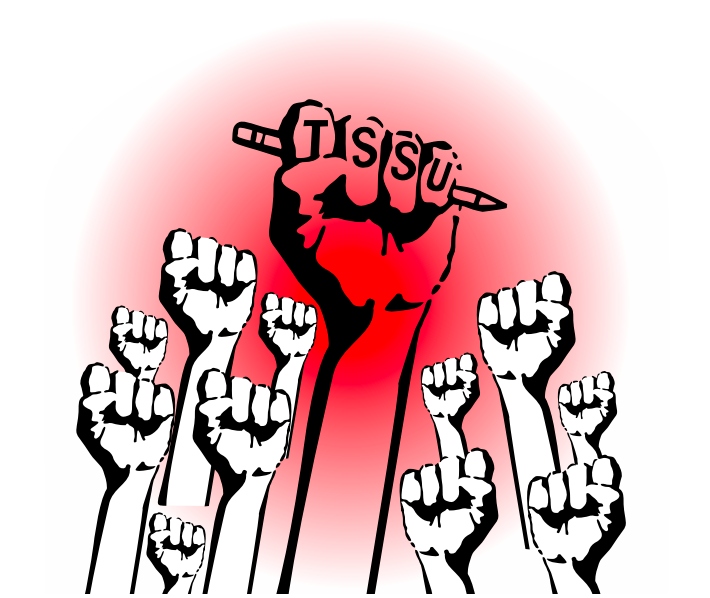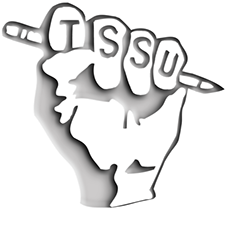SSJC Letter in Opposition to TMX Pipeline


The Solidarity and Social Justice Committee of the Teaching Support Staff Union is in support of the letter put forward by Students Against TMX, which calls for ceasing construction of the TransMountain Pipeline and investment in Indigenous-led green infrastructure projects. Our members, whose workplaces are located in direct proximity to the Burnaby Mountain tank farm and terminal, which is unceded Coast Salish territory. We must uphold and commit to empowering Indigenous sovereignty, as well as our community safety and therefore call on the government to uphold their promises of reconciliation and address the ongoing climate crisis by stopping the pipeline expansion immediately.
We stand with the signatories of the Students Against TMX letter, which include thirteen student groups representing 180,000 post-secondary students across Canada, as well as Simon Fraser University Faculty Association, the Sustainabiliteens, the Wilderness Committee, Burnaby Residents Opposing Kinder Morgan Expansion and the Green Party leadership campaign of former Burnaby North-Seymour candidate Amita Kuttner.
For centuries, Coast Salish peoples have stewarded and protected their territories and communities. Though colonialism has attempted to disrupt and undermine Indigenous relationships to the land, Coast Salish peoples continue to enact their obligation to live in a good way. This can be seen in the recent announcement Tsleil-Waututh Nation solar power project which showcases the nation’s commitment to non-extractive and abusive relationships that are embodied in the TMX project. Indigenous-led clean energy projects are a viable investment alternative as they allow for “self-determined economic development” of First Nations communities. Though many Indigenous nations along the pipeline route have agreed to the project, this kind of consent is questionable given the enforced poverty many nations experience despite their territories being used for extractive projects. In the Native Youth Sexual Alliance report on environmental violence, a Diné citizen states “When you grow up in a territory that has every type of industry you can think of, even for myself, it’s so highly normalized you don’t question them anymore. In fact, you have an allegiance to these industries. And you don’t think twice about how they are keeping us in poverty.” This is the reality for Indigenous communities that are economic hostages within the systems on which they depend. It often ends up being the families and community members working for industry in order to survive, thereby making it difficult to break out of the cycles of participation. For the TMX in BC, Grand Chief Stewart Phillip, who is the current President of the Union of British Columbia Indian Chiefs, has pointed to the question of who it is that consent needs to be gained from, stating that "title is territory-wide, it encompasses the entire footprint of the territory and the proper titleholders are the individual members of the First Nation community, not the elected band councils". Similarly, Chief Judy Wilson of the Neskonlith First Nation states:
We have the Trans Mountain pipeline here in our territory that has no consent from our proper titleholders either. They say they have some agreements signed with bands, but bands can’t own a territory. The federal government created [the elected chief and councils], not our people, and here there has been no transfer of authority.
We have seen the government and industry use police, injunctions, and colonial law used as tools against Indigenous peoples enacting their laws, rights, and obligations. These actions are in opposition to the narratives of “reconciliation” or a “just recovery” (or even the law itself) that have been proliferated by your government. The controversial pipeline has a long history of protest and arrests of Indigenous peoples and allies include repeated actions against matriarchs at the Tiny House Warriors, ongoing arrests and legal proceedings in 2014 and 200+ allies arrested in 2018 to the police removal of a tree camp occupation that had been started by an SFU professor. The use of police and incarceration against specifically Indigenous peoples asserting even their basic human and Aboriginal rights is part of a long history of racism and oppression that is the foundation of the RCMP and other policing units.
It is not only Indigenous peoples, and allies who we stand with in opposition to the pipeline. On the day of the 2020 TMX General meeting, PSAC Locals 901 and 350 held a candle lit vigil and called on the government of Canada to stop construction. Economists have also stated that the argument of economic benefit of the TMX is questionable at best. As stated by David Hughes in a recent Vancouver Sun op-ed, “recent developments show that sufficient pipeline export capacity is being developed without TMX and that prices in Asian markets, coupled with higher transportation costs, will net Canadian oil producers less than U.S. markets. In addition, the cost of the expansion has increased from $7.4 to $12.6 billion.” There is also little benefit to Canada in terms of direct access to oil and gas as more than half of current production is exported with declining returns to Canadians in terms of royalties and taxes. The Canadian Centre for Policy Alternatives has released a report that addresses significant new developments that bear on the need for TMX since the government purchased the project in 2018 and approved it for the second time in 2019. Ultimately the report states that any claims of economic and climate change benefit that could be garnered from this project are objective inaccurate. Canada’s own Parliamentary Budget Officer has confirmed that the TMX can be profitable only if no climate action is taken by Canada.
However, the government must prioritise taking action against global warming and ever-increasing climate emissions instead of investing in non-renewable energy sectors such as the TMX pipeline. TransMountain promised to invest TMX’s revenue to a green economy, however, this simply does not make sense. Transmountain estimated that TMX will emit 400,000 tonnes of greenhouse gases into the atmosphere each year, however, a report by Environment and Climate Change Canada (ECCC) estimates that TMX would emit 13 to 15 million tonnes of CO2 each year. This number includes the production, processing and transportation of an additional 590,000 barrels a day, while TransMountain’s number only includes construction and operation of the pipeline. Neither report acknowledges the emissions of the destruction of forests and wetlands, or calculate the exact number of hectares of land lost. TMX clearly does not align with Canada’s climate goals, nor with Bill C-12; a piece of legislation that holds Canada accountable to their efforts to achieve net-zero greenhouse gas emissions by 2050. If Canada aims to approach net-zero emissions, the government would need to reduce emissions by three to four per cent each year. To illustrate this, Canadians would need to reduce their emissions by more than 20 megatons per year. Oil and gas production contributes the most to Canada’s carbon emissions, as it makes up 26 percent of Canada’s CO2 emission and 5.3 per cent of the GDP in 2019. Canada can simply not build TMX and achieve its climate goals, let alone a safe, sustainable future for local communities.
It is not only the future that such a project puts at risk. Jim Leyden of the Kwekwecnewtxw, Coast Salish WatchHouse, put forward an open letter on June 2, 2020 that described numerous observations of violations related to COVID-19 physical distancing and PPE orders. This violation of workplace safety not only endangers local communities, but also workers and their families. Jim states that when disclosed to Federal and Provincial Ministries, they have been “consistently dismayed by the failure….to follow up with full and appropriate investigations, instead,bowing down to the unreasonable and disproportionate power and influence of the fossil fuel industry.” As stated in their letter, Students Against TMX also pointed toward the danger the tank farm puts the local community in should there be a tank fire. The Burnaby Mountain Tank Farm facility is located in the city of Burnaby, whose municipal government opposes the expansion. It sits right below the only emergency route off of Burnaby Mountain, in close proximity to Forest Grove Elementary and University Highlands Elementary, and to SFU. According to a study commissioned by the City of Burnaby, with the expansion of the tank farm, the chance of a tank fire increases from 1 in a million to a 1 in 2000 chance per year. In the case of such an event, Gaglardi intersection is the only escape route, meaning that thousands of Burnaby Mountain residents, over 30,000 students and staff at Simon Fraser University, and hundreds of young children at both elementary schools would be trapped on the mountain.
Instead of proceeding with TMX, what Canada urgently needs is a viable and ethical energy strategy that considers Indigenous sovereignty and rights. Therefore, we support the demands of Students Against TMX in their calls to action which include:
1. Immediately cease TMX and commit to honouring Indigenous sovereignty
We call for the immediate ratification and legislation of the United Nations Declaration on the Rights of Indigenous Peoples (UNDRIP) in present-day Canada. This is essential to a Just Recovery. The Senate's failure to pass Bill C-262 was deeply frustrating, and if the Liberal Party is committed to “implement[ing] the Declaration as government legislation by the end of 2020”, then it must recognize that the approval and construction of TMX violates the Declaration.
We call for the implementation of the calls to action in Volumes 1a and 1b the Final Report of the National Inquiry into Missing and Murdered Indigenous Women and Girls.
2. Invest in Indigenous-led green infrastructure and green job-retaining initiatives
We call for the reallocation of funds directed to TMX into current and future Indigenous-led green infrastructure, rather than merely investing the disputed projected revenue into future clean energy projects. This will accelerate the transition to a clean economy, and allow us to ensure that the Liberal Party’s commitment to “all Indigenous communities [being] powered by clean, renewable, and reliable sources of energy” is realized before 2030.
We call on the federal government to direct funds towards green job-retraining initiatives, such as those proposed by Iron and Earth. It is not only workers who are directly involved in the fossil fuel industry who struggle in the wake of the downturn in oil markets, but those who are involved indirectly, many of whom belong to marginalized groups. All Canadians, including marginalized workers in the fossil fuel industry, deserve a just transition to a low-carbon economy, and an energy transition task force - such as th-e Task Force on Just Transition for Canadian Coal Power Workers and Communities - should also be organized for Canadian fossil fuel workers and their communities. The federal government's insistence on expanding fossil fuel production undermines transnational efforts to limit global temperature increase to 1.5°C or 2°C. Therefore, it is also time to end subsidies to the failing fossil fuel industry.
The TSSU further recognises the need to:
3. Enshrine an enforcement of treaty rights into law;
4. Establish Aboriginal title to unceded territories;
5. Fully operationalise practices of full, prior, and informed consent that center Indigenous practices of decision-making and relationality. (see “Consent” prepared by Doug Kwulasultun White for the UBCIC)
6. Investigate and take action against the mechanisms that allow for the weaponization of injunctions against Indigenous peoples in Canada. Currently injunctions are used as a “legal billy club” against Indigenous peoples and laws. According to a report by Yellowhead Institute “76 percent of injunctions filed against First Nations by corporations being granted, while 81 percent of injunctions filed against corporations by First Nations were denied. Perhaps most tellingly, 82 percent of injunctions filed by First Nations against the government were denied.”
Please update us on any action taken towards these demands,
Solidarity and Social Justice Committee
Teaching Support Staff Union
ssjc@tssu.ca
